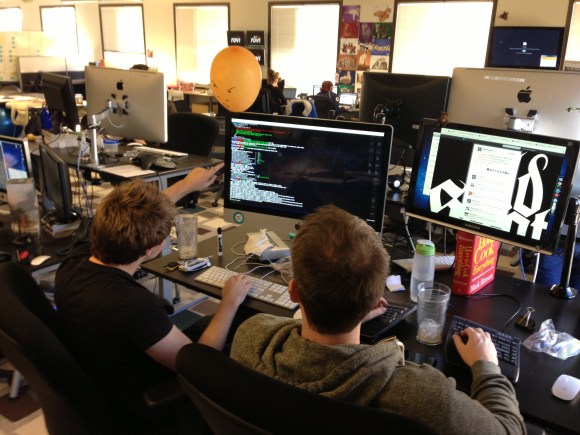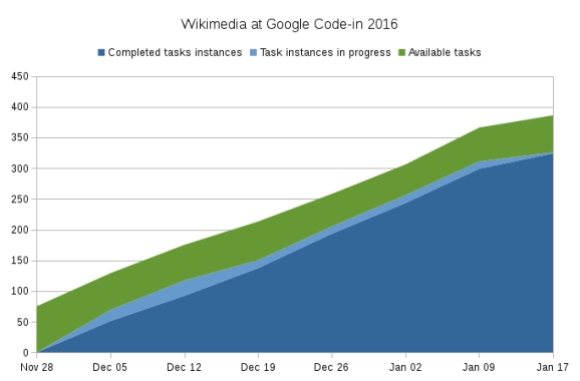
Google Code-in is an annual contest for 14-17-year-old students exploring free and open source software projects via small tasks in the areas of code, documentation, outreach, research, and design. Students who complete their tasks receive a certificate and a T-shirt from Google, while the top students in every participating organization get invited to visit the Google headquarters in Mountain View, California.
For the fourth time, Wikimedia was one of the participating organizations by offering mentors and tasks.

To list some student achievements:
- Many improvements were made to the Pywikibot framework, Kiwix (for Wikipedia offline reading), Huggle (to fight vandalism), Wikidata, documentation, etc.
- 20 improvements were carried out on the Wiki Education dashboard.
- MediaWiki’s Newsletter extension was subject to extensive code changes.
- The Pageview API offered monthly request stats per article title.
- A dozen MediaWiki extension pages received screenshots.
- Glossary wiki pages followed the formatting guidelines.
- Research on team communication tools was carried out.
- Many deprecated codes in MediaWiki core and extensions were removed.
- Long CREDIT showcase videos were split into ‘one video per topic’ videos on Wikimedia Commons.
- Proposals for a redesign of the Romanian Wikipedia’s main page.
- jQuery.suggestions offered suggested reasons to block, delete, protect forms.
- A {{PAGELANGUAGE}} magic word was added.
- Performance improvements to the importDump.php maintenance script were made.
- Special:RecentChanges was converted to use the OOUI library.
- Allowed users to apply change tags as they make logged actions using the MediaWiki web API.
- Added the ability to configure web service endpoint and added phpcs checks in MediaWiki’s extension for Ideographic Description Sequences.
Examples of what some participating students wrote about the event:
- “In 1.5 months, I learned more than in 1.5 years.” — Filip
- “I know these things will be there forever and it’s a big thing for me to have my name on such a project as MediaWiki.” — Victor
- “What makes kids like me continue a work is appreciation and what the community did is giving them a lot.” — Subin
- “I spent my best time of my life during the contest.” — David
Congratulations to our winners (Filip Grzywok, Justin Du), to our finalists (David Siedtmann, Nikita Volobuiev, Yurii Shnitkovskyi), and to the many hard working students for their valuable contributions to make free knowledge available for everybody. We’ll see you around on IRC, mailing lists, tasks, and patch comments.
We would like to thank all our mentors for their commitment. The time they spent on weekends, coming up with task ideas, working together with students and quickly reviewing contributions.
Wikimedia always welcomes contributions to help improve our free and open software. Check out how you can contribute.
Andre Klapper, Bug Wrangler in the Technical Collaboration team
Wikimedia Foundation

Can you help us translate this article?
In order for this article to reach as many people as possible we would like your help. Can you translate this article to get the message out?
Start translation